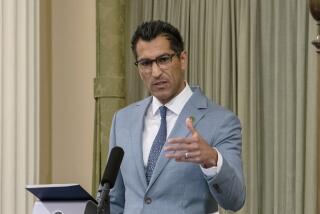Cigarette Tax Increase Proposal
- Share via
Richard C. Paddock’s article (May 19), regarding the proposed legislation to raise the cigarette tax by 25 cents a pack, to pay for cancer research and other related programs, was a revelation to me. The manner in which the proposed bill died in the Assembly committee was a prime example of democracy at work in this country.
The tobacco industry is stated as having bought the votes of the Assembly Revenue and Taxation Committee chairman and the nine other lawmakers who now sit on the panel.
The most vociferous opposition to the bill came from Assemblyman Richard E. Floyd (D-Hawthorne), who smoked both a cigarette and a cigar during the debate. He was the recipient of $3,000 in campaign contributions from the Tobacco Institute last session.
It is inconceivable to me that such a confirmed nicotine addict can function unbiased to enact legislation aimed at improving the public’s health and decreasing hospital costs for the lobectomies and pneumonectomies, radiotherapy and chemotherapy for cancer victims, and coronary bypass and intensive care units needed to care for those suffering the consequences of using tobacco.
The excuses offered by Assemblymen Dave Elder (D-Long Beach) and Thomas M. Hannigan (D-Fairfield), who were also mentioned as financially supported by the Tobacco Institute, highlighted their prejudices. A monetary reward for not smoking parallels the reward from the Tobacco Institute for not considering passage of the bill.
The argument that a constitutional amendment raising taxes should not specify how the money should be spent, is fallacious. The House of Representatives in Washington constantly adds amendments to bills and specifies precisely how certain money shall be spent.
These honorable assemblymen are undoubtedly congratulating themselves on their performances relating to the cigarette tax increase proposal.
It is hoped that the electorate, whose votes placed them in such an office of responsibility, would see them now for what they are--no better than the gangsters that they said would smuggle cigarettes into the state and sell them at reduced prices if the law were enacted.
PAUL JERNSTRON MD
Los Angeles
More to Read
Get the L.A. Times Politics newsletter
Deeply reported insights into legislation, politics and policy from Sacramento, Washington and beyond. In your inbox twice per week.
You may occasionally receive promotional content from the Los Angeles Times.









